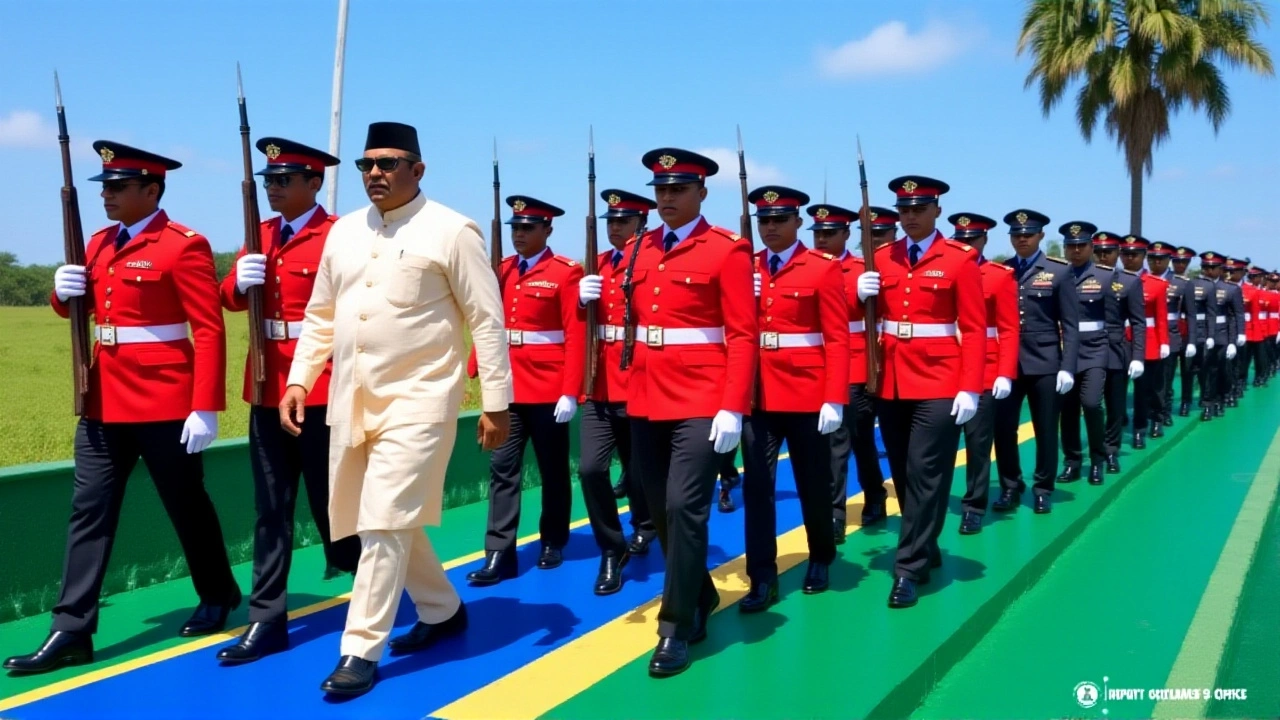 Nov, 10 2025
Nov, 10 2025
President Bola Ahmed Tinubu has approved the recruitment of 30,000 police constables across Nigeria — a move officials say could finally begin to reverse decades of chronic understaffing in the Nigerian Police Force. But here’s the catch: the recruits won’t step onto the streets until the country’s crumbling police training schools are completely rebuilt. The announcement, made by Inspector General of Police Kayode Egbetokun during multiple Passing Out Parades in late 2025, was met with cautious optimism. At the Police Training School Odukpani in Cross River State in October 2025, Assistant Inspector General Auwal Muhammad confirmed the presidential directive. Weeks later, at the Police Training School Farfaru in Sokoto State on November 7, 2025, Goygon A. Grimah added that the recruitment would become an annual event for the next several years. The twist? No one’s being sent to the field until the training infrastructure can support them.
Why Training Facilities Are the Real Bottleneck
It’s not enough to hire 30,000 officers if they’re trained in leaking roofs, broken latrines, and classrooms without electricity. That’s the blunt reality laid out by Rivers State Governor Siminalayi Fubara and Governor Mbah, who chairs a presidential committee tasked with auditing every police and NSCDC training center in Nigeria. "You cannot recruit 30,000 policemen and train them in this kind of environment," said Abiodun, a committee member. "You cannot incubate policemen here and expect them to behave like professionals when they get out." The committee, personally inaugurated by President Tinubu, split into northern and southern teams in October 2025 with a strict four-week deadline. Consultants are already drafting detailed bills of quantities — cost estimates, material lists, timelines — for 17 major training facilities from Sokoto to Calabar. "This won’t be a patchwork," Abiodun emphasized. "It will be a total rebuild."Where the Recruits Are Headed — And Why
The deployment plan is as strategic as it is urgent. Assistant Inspector General Victor Olaiya, speaking at the Minna Police Training School in Niger State, revealed that 70% of the first batch will be assigned to Niger State alone. Why? Because the state spans over 76,000 square kilometers — larger than Greece — with sparse policing coverage and rising banditry. Meanwhile, the North West, North Central, and South East remain hotspots of insecurity, and the force currently has fewer than 180,000 officers for a population of over 220 million."Current officers work 18-hour shifts, seven days a week," said IGP Egbetokun. "Many haven’t taken a full day off in months. This recruitment isn’t just about numbers — it’s about survival. For them, and for the people they’re supposed to protect." At the Sokoto parade, Governor Ahamed Aliyu’s representative, Deputy Governor Idris Muhammed Gobir, urged the 483 new constables to reject corruption and uphold integrity. "Be guided by fairness," he said. "The public doesn’t need more enforcers. They need protectors."
A Broader Vision: Professionalism Over Patronage
Governor Fubara called the initiative "a bold and practical step," noting that past recruitment drives often failed because training was rushed or politicized. "This is not just about fixing buildings," he said. "It’s about building capacity, restoring morale, and motivating officers to perform like their counterparts anywhere in the world." The move aligns with Tinubu’s broader security doctrine: invest in human capital before hardware. While previous administrations focused on buying more vehicles and weapons, this administration is betting that professional training is the true force multiplier. Egbetokun confirmed that welfare improvements — including better pay, housing, and medical care — are part of the same package. "We’re seeing renewed investments in manpower, logistics, and welfare," he said. "All of which are essential to building a more responsive and people-centered police force."
What Happens Next?
The presidential committee is expected to deliver its final report by mid-December 2025. Once approved, construction will begin immediately, with the first new recruits expected to enter training by March 2026. The rollout will be phased: 10,000 in 2026, another 10,000 in 2027, and the final 10,000 in 2028. Each cohort will graduate from newly renovated facilities — not the same crumbling buildings that have turned Nigeria’s police academies into symbols of neglect.There’s skepticism, of course. Past promises — like the 2018 pledge to recruit 10,000 officers — never materialized due to budget shortfalls and bureaucratic inertia. But this time, the president’s personal involvement and the upfront investment in infrastructure signal a different intent. "If they build it properly," said retired Commissioner of Police Aliyu Mohammed, "and if they keep the funding flowing, this could be the most meaningful reform in the Nigerian Police Force since 1999."
Background: Decades of Neglect
The Nigerian Police Force has been under-resourced since the 1980s. By 2020, the UN recommended a ratio of one officer per 400 citizens. Nigeria’s ratio? One per 1,200. Training schools like Farfaru and Odukpani were built in the 1970s and 80s, with no major upgrades since. Many lack running water, proper dormitories, or even functional firing ranges. Recruits have been forced to train in makeshift tents, sometimes without uniforms or rifles. In 2023, a leaked internal audit found that 83% of training centers were "non-operational" by international standards.And yet, the public still expects results. In 2024, over 2,000 kidnappings were reported in Nigeria — a 40% increase from 2022. The police’s response rate? Less than 15%. This recruitment, if executed correctly, could change that. But only if the training matches the ambition.
Frequently Asked Questions
When will the 30,000 police recruits actually start training?
Training won’t begin until after the presidential committee submits its infrastructure report, expected by mid-December 2025. Construction will start immediately after approval, with the first new recruits entering renovated facilities by March 2026. The entire process is phased: 10,000 per year over three years, contingent on facility readiness.
Why is Niger State getting 70% of the first batch?
Niger State covers over 76,000 square kilometers — larger than Greece — with vast rural areas and rising banditry. With fewer than 3,000 officers currently serving the entire state, response times often exceed 12 hours. The 70% allocation aims to create a critical mass of police presence to deter attacks and improve rapid response in the North Central region.
How is this different from past recruitment drives?
Past efforts focused on hiring without fixing training infrastructure, leading to poorly prepared officers who often joined the force corrupt or demoralized. This time, President Tinubu is insisting on rebuilding training centers first. The presidential committee’s involvement, detailed cost assessments, and phased rollout signal a structured, long-term plan — not a political stunt.
What happens if the funding for training centers dries up?
The presidential committee’s bill of quantities includes multi-year budget projections, and the Ministry of Finance has reportedly ring-fenced funds for the project. Still, past corruption scandals raise concerns. Transparency advocates are calling for public dashboards to track spending. Without accountability, even well-planned projects risk failure.
Are other security agencies being included in this rebuild?
Yes. The committee’s audit covers not just police training schools but also NSCDC (National Security and Civil Defence Corps) facilities. This reflects a broader push to professionalize all frontline security agencies. The NSCDC, which patrols oil pipelines and borders, has been equally neglected, and its training centers are in similar disrepair.
Will this reduce crime in Nigeria?
Not immediately. But experts say that with 30,000 properly trained officers, response times and deterrence could improve significantly within two years. The key is quality, not quantity. One well-trained officer who earns public trust is worth ten poorly trained ones. This initiative’s success hinges on whether Nigeria finally treats policing as a profession — not a political job.

Mitch Roberts
November 12, 2025 AT 15:34Mark Venema
November 12, 2025 AT 16:23Brian Walko
November 14, 2025 AT 06:09Derrek Wortham
November 14, 2025 AT 08:35Derek Pholms
November 15, 2025 AT 12:19musa dogan
November 16, 2025 AT 12:50Mark Dodak
November 17, 2025 AT 18:15Stephanie Reed
November 18, 2025 AT 08:28Jason Lo
November 18, 2025 AT 12:42Brian Gallagher
November 19, 2025 AT 04:33